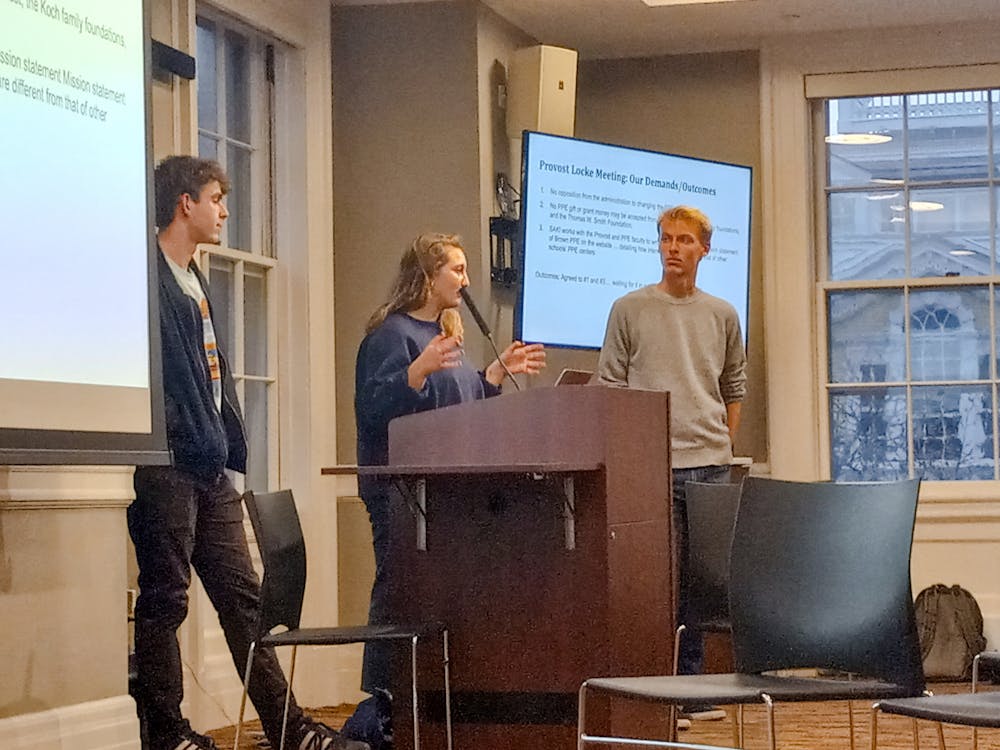Students Against Koch Influence presented to the Undergraduate Council of Students at the UCS general body meeting Wednesday evening.
SAKI is an organization of students that seeks to push back against the influence of the Koch Foundation, a national donor network run by billionaire and conservative political mega-donor Charles Koch, at the university level.
The Koch Foundation “seeks to influence college campuses through the (circulation of) information that is often false, destructive and which advances a pro-corporate agenda,” said Isaac Slevin ’25, one of the SAKI presenters. The group went on to explain their concerns and research regarding Koch influence on the University’s campus, and how they plan to address it moving forward.
One of the main concerns identified in SAKI’s presentation was the ongoing campus debates around the existing Political Theory Project and its pending conversion into the Philosophy, Politics and Economics Center. The vote to establish this center had been postponed at multiple faculty meetings, The Herald previously reported.
The PTP currently runs programs like the PPE Society, which pays students to participate in reading and research, said Ethan Drake ’24, SAKI presenter and former student member of the PPE Society.
“I will say, from my experience with PTP, it’s not like there’s some big Koch indoctrination program there to nefariously influence all of these students,” Drake said. “It’s more the principle of the thing,” he added.
Drake elaborated, saying that the University was “setting a nationwide standard by allowing these donors to be present on our campus.” He added that “many students are becoming wary that students are being paid $500 a month to be part of a reading group that is funded by the Koch brothers.”
“This isn’t really about left or right,” Slevin said. “This is about an ideology advanced by corporations to favor themselves ahead of student interests.”
Drake also mentioned Koch contributions to DonorsTrust as a concern.
DonorsTrust aims to protect “constitutional liberties and (strengthen) civil society through private institutions,” according to the fund’s website.
The PPE Center would expand the PTP, giving it greater influence on campus and incorporating it into a larger network of Koch-influenced PPE Centers on other college campuses, Slevin said. SAKI has met with a number of University administrators to discuss their concerns and formulate their demands.
“Initially we went into this process wanting to block the foundation of the PPE firmly,” said Pilar McDonald ’24, who was also another SAKI presenter. But after SAKI’s push to delay the vote on the Center’s establishment and research and conversations with a number of faculty and administrators, “we understand that it may be passed and so (we) have refocused a lot of our energy on … making sure the programming has different” checks against Koch influence, she added.
SAKI presenters went on to list their demands. These included a name change to prevent association with existing, Koch-influenced PPE Centers on other college campuses, the establishment of a Gift Acceptance Policy as well as a committee to enforce it and a clear, accessible definition distinguishing the University’s PPE Center from those on other campuses, McDonald said.
The Gift Acceptance Policy is largely inspired by a similar pending policy at Massachusetts Institute of Technology in response to the donations they received from the Epstein foundation, Drake said.
It is important to SAKI that students sit on the Gift Acceptance Committee, Slevin said. When they met with President Christina Paxson P’19, she shared a preliminary proposal that did not meet this expectation, he added.
“The whole issue is transparency,” he said. “Brown students have always been the engineers of our own education, and this should be no different.”
Also at the meeting, UCS Fall Poll Heads John Lin ’23 and Lucca Paris ’24 presented their findings from the previous semester’s fall poll. These included which foods students are interested in having on the dining menu, which study spaces on campus should be open longer, pedestrian safety on campus and student perception on other relevant University initiatives, Paris said.
Lin and Paris spoke with University administrators regarding their results. Lin noted that University administrators tended to be more responsive to initiatives they could address quickly and promptly. Initiatives that required more personnel, funds and other University resources were harder to push, he added, citing common student complaints regarding access to the University’s Counseling and Psychological Services as an example.
Still, Lin and Paris were optimistic about the potential impact of their polling. “If you go to (the Office of Residential Life) and you say UCS wants something, they’re going to be like… meh,” Lin said. “But if you say students want it, they’re immediately going to be more receptive.”
“I think it would be a good idea if polling became a larger part of UCS,” Paris added. “Sure it took a while, but the data we got is really valuable and we should take advantage of this incredible medium.”
Correction: A previous version of this article incorrectly spelled Isaac Slevin's name in one instance. The Herald regrets the error.





